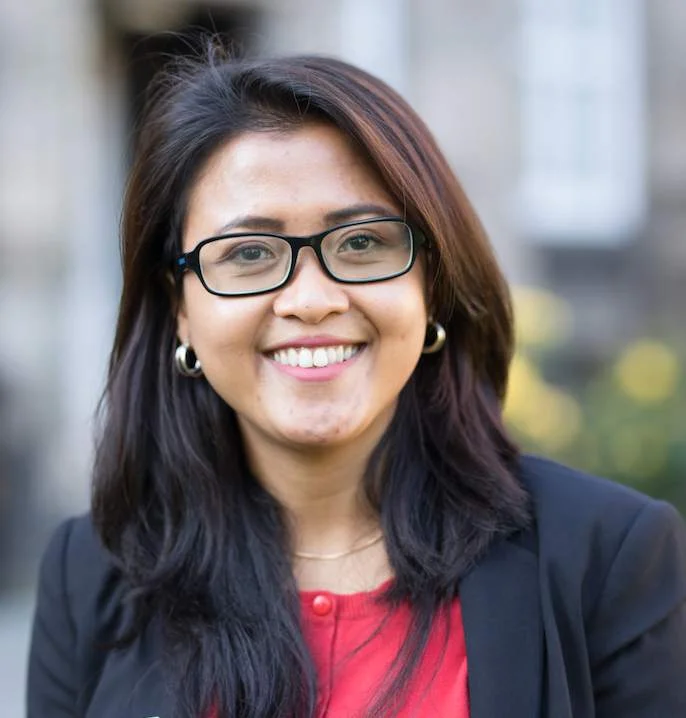Accelerating the Economic Recovery in Indonesia Post Covid-19: Justice in the Energy Transition
Dr. Theresia Sumarno, Dr. Andang Bachtiar, Artody Nugroho Jati
Dr Theresia Betty Sumarno
Centre for Energy, Petroleum and Mineral Law & Policy (CEPMLP), University of Dundee
Short Biography:
Theresia received her PhD from the CEPMLP, the University of Dundee in 2020. Her current research projects include exploring the energy transition in Indonesia and comparisons with other island nations around the world, including the Caribbean and Africa. She presented her previous research globally around the world in Europe, Latin America, Middle East, North America, Africa and Asia. Currently, she is a visiting lecturer at the Universidade Eduardo Mondlane in Mozambique, an academic tutor at the School of Management, University of St. Andrews, and the country report editor for the Global Energy Law and Sustainability Journal. Currently she is an Energy Policy Consultant at the International Institute for Sustainable Development
Dr Andang Bachtiar
Former National Energy Council Member, now resides in Paris, France
Short Biography:
Dr Andang served the Republic of Indonesia as Elected Member of National Energy Council of the Republic of Indonesia until 2017. He was the Chairman for National Exploration Committee in Indonesia reported to the Minister of Energy and Mineral Resources, Republic of Indonesia. Not only serving directly to the Country, Dr Andang had also been a lecturer at University of Indonesia and Institute Technology, Medan, Indonesia from 2009-2017. Currently, Dr Andang is an Exploration Director at Maurel et Prom, Paris and Senior Advisor of President Director of Pertamina International E&P. He is also the Secretary-General of Association of Oil & Gas Producing Region Republic of Indonesia.
Artody Nugroho Jati
National Energy Council, Economic and Policy Analyst
Short Biography:
Artody is an engineer with ten years experience in the energy policy analyst from both technical and market perspectives. He has strong technical skills in the preparation of statistical data related to energy indicators (social, economic and environmental) and developing energy supply and demand models, mainly by using The Long Range Energy Alternative Planning System (LEAP) Model’s to forecast supply and demand energy in the future. He also sanalyses of the impact of energy policy, both technical and economic impact. He has experience in quantitative policy regulation analysis of strategic issues and options related to infrastructure investment, economic development analyses, pricing and financing, and regulation evaluation. He gained valuable coordination experience in the energy sector with other Ministry in Indonesia, local Government, and other international energy organisation. Currently working at Secretariats General of National Energy Council, Indonesia.
Abstract
Indonesia is known as the largest economy in South East Asia and as one of the emerging lower-middle-income countries. Before the pandemic Covid-19, Indonesia forecasted its GDP growth to increase to 5.5% in 2020. However, this never happened following the pandemic it decreased to 2.97% in the first quarter of 2020. This paper focuses on the renewable energy role in accelerating the economic recovery in Indonesia by emphasising the role of justice in the transition process.
We conduct systematic reviews from different sources, both primary and secondary resources. We qualitatively analyse the energy regulation and energy road map in Indonesia as well as some academic research articles. Indonesia has developed its general energy plan related to the energy mix demand and supply, which includes a long-term plan on developing renewable energy sources and reducing the use of fossil fuels. As the fourth most populated country in the world, Indonesia still focusses on cheap energy supply and energy access to fulfil the energy demand. Therefore the transition process in Indonesia is considered slow compared to the OECD countries.
There is a significant role of energy in economic growth, both energy consumption and energy resources. Until now, fossil fuels have dominated the Indonesian energy supply and demand. This paper highlights the role of renewable energy in the economic development of the country.
This paper suggests that the pandemic has highlighted the energy transition movement in Indonesia. The Covid-19 has driven more research on the role of renewable energy project to the economic development and demonstrate that a transition to a low-carbon economy could contribute to the economic recovery in a justice way in many sectors. Renewable energy development contributes directly to human resources development, and this development also contribute to health sector improvement. Finally, this renewable energy development could accelerate the economic recovery in Indonesia and reach 5.2 to 5.6% in 2021.
Keywords: renewable energy, energy justice, just transition, economic growth

Recent Comments